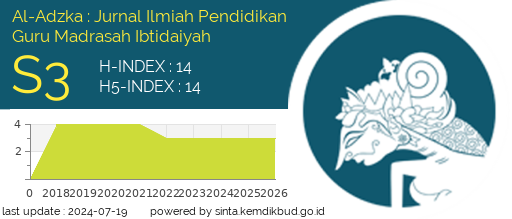KONSEP JUJUR DALAM ALQURAN
DOI:
https://doi.org/10.18592/aladzkapgmi.v7i1.2019Keywords:
Honest, True, Qur'anAbstract
The word honest is taken from the word shadaqa which means true. The honest concept according to the Qur'an means true, and true is one of the characteristics of Allah, the nature of angels, and the obligatory nature of the Prophets and Apostles. Honest means true, as it is; say true, be right, be righteous, occupy good promise to others, self, and promise to Allah and His Apostle. The true news is what fits its reality. In the view of religion, true is what corresponds to what is believed. As something that is believed, honestly plays as a value (value) that must be taught, instilled, and internalized to the child in his life. Some methods of cultivating the value of honesty in children, among them with methods of havoc, habituation, telling stories, giving advice, reward and punishment, all adjusted to the cognitive and affective levels of children.References
Ahda Bina, Dahsyatnya 4 Sifat Nabi; Sidiq, Fathanah, Amanah, Tablig, Surakarta: Sajada, 2013
Amirulloh Syarbini, Pendidikan Karakter Berbasis Keluarga, Studi tentang Model Pendidikan Karakter dalam Keluarga Perspektif Islam, Yogyakarta: Ar-Ruzz Media, 2016
Amr Khaled, Akhlaq al-Mu’min, diterjemahkan oleh Fauzi Faisal Bahreisyi, Buku Pintar Akhlak, Memandu Anda Berkepribadian Muslim dengan Lebih Asyik, Lebih Otentik, Jakarta: Zaman, 2012
An-Nawawi, Syarah Shahih Muslim, Jakarta: Darus Sunnah, 2011
Ary Ginanjar Agut Bangkit Deng an 7 Budi Utama; Kumpulan Kisah Spiritual Penggugah Motivasi, Jakarta, PT. Agra Publishing, 2009
Atabik Ali dan Ahmad Zuhdi Muhdlor, Kamus Kontempiorer Arab-Indonesia, Yogyakarta: Multi Karya Grafika Pondok Pesantren Krapyak, t.th, Cet. 8.
Haedar Nashir, Pendidikan Karakter Berbasis Agama dan Budaya, Yogyakarta: Multi Presindo, 2013
Lanny Oktavia, dkk., Pendidikan Karakter Berbasis Tradisi Pesantren, Jakarta: Rumah Kitab, 2014.
M. Quraish Shihab, Tafsir Al-Mishbah: Pesan, Kesan, dan Keserasian Alquran, Jakarta: Lintera Hati, 2002
Majma’ Lughah Al-Arabiyah, Al-Mu’jam al-Wajiz, Kairo: Maktabah al-Syuruq al-Dauliyah, 2004
Muhammad Abu Hamid al- Ghazali, Ihya’ Ulum al-Din, Beirut: Dar al-Fikir, t.th., Jilid 4
Muhammad Fuad Abd Al-Baqi’, Al-Mu’jam Al-Mafahras li Alfaz Al-Qur’an Al-Kareim, Jami’ Al-Azhar Kairo : Dar Al-Hadits.
Munir Baalbaki & Rohi Baalbaki, Al-Maurid (Arab-Inggris-Indonesia), penerjemah Ahmad Sunarto, Surabaya: Halim Jaya, t.th
Shafwah Abdul Fattah Mahmud, Jujur Menuju Jalan yang Benar, Yogyakarta: Bintang Cemerlang, 2001
Tim Penyusun Kamus Pusat Bahasa, Kamus Besar Bahasa Indonesia, Jakarta: Balai Pustaka, 2005, Cet. 3.
Downloads
Published
How to Cite
Issue
Section
License
Copyright (c) 2018 Raihanah Raihanah

This work is licensed under a Creative Commons Attribution 4.0 International License.
Authors who publish with this journal agree to the following terms:
- Authors retain copyright and grant the journal right of first publication with the work simultaneously licensed under a Creative Commons Attribution 4.0 International that allows others to share the work with an acknowledgement of the work's authorship and initial publication in this journal.
- Authors are able to enter into separate, additional contractual arrangements for the non-exclusive distribution of the journal's published version of the work (e.g., post it to an institutional repository or publish it in a book), with an acknowledgement of its initial publication in this journal.
- Authors are permitted and encouraged to post their work online (e.g., in institutional repositories or on their website) prior to and during the submission process, as it can lead to productive exchanges, as well as earlier and greater citation of published work.








